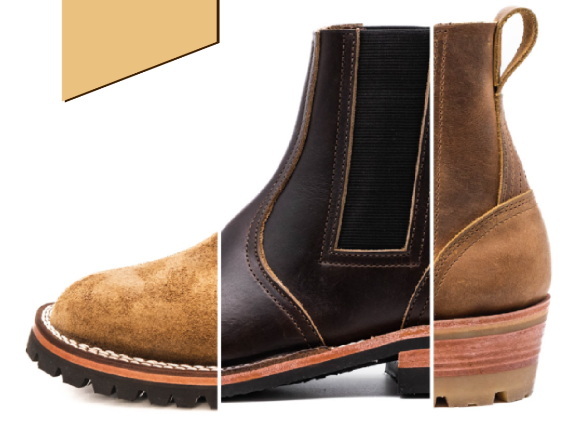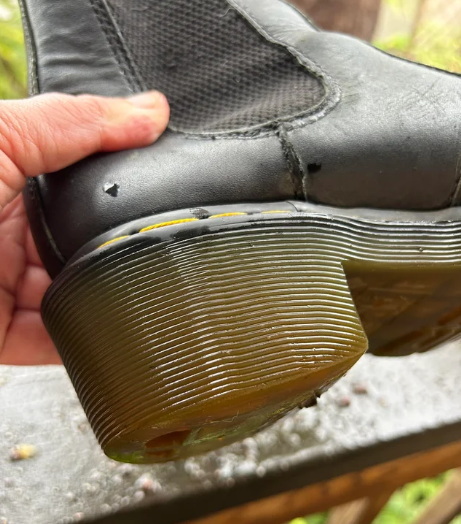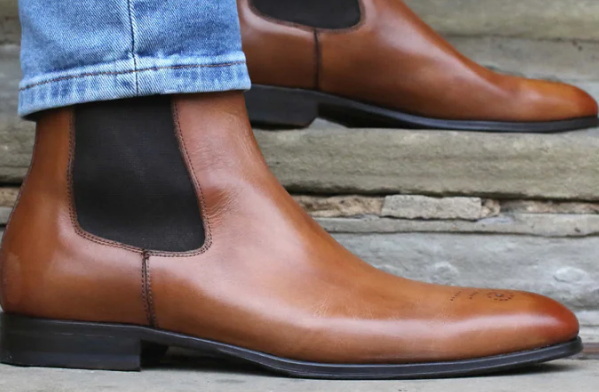Content Menu
● Introduction
● Understanding Why Chelsea Boots Rub
● Choosing the Right Chelsea Boots
>> Size and Fit
>> Material
>> Style
● Breaking In Your Chelsea Boots
>> Wear Them Around the House
>> Use Thick Socks
>> Apply Leather Conditioner
>> Flex the Seams
>> Use a Boot Stretcher
>> Heat and Cool the Leather
● Additional Tips and Tricks
>> Moleskin or Bandages
>> Over-the-Calf Socks
>> Adjust Lacing (If Applicable)
>> Consider Boot Cuffs
● When to Seek Professional Help
● Conclusion
● FAQ
>> 1. Why do my new Chelsea boots hurt my ankles?
>> 2. Can I stretch my Chelsea boots at home?
>> 3. What type of socks should I wear with Chelsea boots to prevent rubbing?
>> 4. How often should I apply leather conditioner to my Chelsea boots?
>> 5. What can I do if my Chelsea boots are too tight around the calf?
● Citations:
Introduction
Chelsea boots are a stylish and versatile footwear choice, loved for their sleek design and ease of wear. However, one common issue many people face is the discomfort caused by the boots rubbing against the calf. This can lead to irritation, blisters, and a less-than-pleasant wearing experience. Fortunately, there are several effective strategies to prevent and alleviate this problem, allowing you to enjoy your Chelsea boots in comfort.
This article provides a comprehensive guide on how to stop Chelsea boots from rubbing your calf. We'll cover everything from choosing the right size and materials to breaking in your boots properly and using helpful accessories. Whether you're a long-time Chelsea boot enthusiast or a newcomer to this classic style, you'll find valuable tips to ensure a comfortable fit.

Understanding Why Chelsea Boots Rub
Before we dive into solutions, it's essential to understand why Chelsea boots can sometimes rub against the calf. Several factors contribute to this issue:
- Improper Fit: Boots that are too tight or too loose can cause friction against the skin.
- Stiff Materials: New leather boots, in particular, can be stiff and inflexible, leading to rubbing.[1]
- Lack of Socks: Wearing thin or no socks can exacerbate rubbing.
- Individual Anatomy: The shape and size of your calf can also play a role.
- Seams and Edges: The seams and edges of the boot can sometimes be abrasive against the skin[2].
Choosing the Right Chelsea Boots
The first step in preventing calf rubbing is to select the right pair of Chelsea boots. Here's what to consider:
Size and Fit
- Accurate Measurement: Get your foot professionally measured to determine your correct shoe size.
- Try Before You Buy: Always try on Chelsea boots before purchasing them. Walk around the store to assess the fit and feel.
- Consider Width: If you have wider feet, look for Chelsea boots that come in wider widths.
- Calf Circumference: Pay attention to the calf circumference of the boots. If you have larger calves, opt for styles with a wider circumference[7].
Material
- Leather: Leather Chelsea boots are classic and durable but can be stiff initially. Look for softer, more supple leathers or consider suede options.
- Suede: Suede is generally softer than leather and requires less break-in time.
- Synthetic Materials: Some Chelsea boots are made from synthetic materials, which can be more flexible and comfortable out of the box.
Style
- Elastic Gussets: Ensure the elastic side panels (gussets) are not too tight, as this can restrict movement and cause rubbing.
- Boot Height: Consider the height of the boot shaft. Taller shafts may rub more against the calf.
- Lining: Check for a soft, smooth lining inside the boot to minimize friction.
Breaking In Your Chelsea Boots
Even with the right size and materials, new Chelsea boots often require a break-in period to become truly comfortable[1]. Here are several methods to expedite this process:
Wear Them Around the House
- Short Intervals: Start by wearing your Chelsea boots for short periods (1-2 hours) around the house[7].
- Gradual Increase: Gradually increase the wearing time each day as your feet become more accustomed to the boots[7].
- Monitor for Hot Spots: Pay attention to any areas where you feel rubbing or pressure.
Use Thick Socks
- Cushioning: Wear thick, cushioned socks to protect your feet and provide extra padding[5][8].
- Stretching: Thick socks can also help stretch the boots slightly as you wear them[8].
- Double Layering: Consider wearing a thin liner sock under a thicker sock to prevent blisters[3].
Apply Leather Conditioner
- Softening: Leather conditioner can help soften the leather and make it more pliable[1][5][7].
- Application: Apply leather conditioner to the inside and outside of the boots, paying particular attention to the areas that rub[5].
- Drying Time: Allow the conditioner to fully absorb into the leather before wearing the boots.
Flex the Seams
- Dampen the Seams: Dampen the inside boot seams with water[2].
- Work the Leather: Work the tops of the boots back and forth, and work the heel counter[2].
- Softening: Continue working both areas back and forth until the ankles are soft enough to wear[2].
- The side seams should end up not indenting into the ankle but instead will either lay flat or even curl outward away from the ankles[2].
Use a Boot Stretcher
- Targeted Stretching: A boot stretcher can gently stretch specific areas of the boot, such as the ankle or calf area[5][7].
- Overnight Use: Insert the boot stretcher overnight to gradually expand the material.
- Leather Softener: It's recommended that you apply a leather softener like Fiebing's Shoe Stretching spray as you stretch your boots[6].
Heat and Cool the Leather
- Warm the Boot: Carefully warm the boot with a hairdryer for a few minutes[5].
- Wear Until Cool: Wear the boot until it cools to help it mold to the shape of your leg.
- Caution: Be cautious not to overheat the leather, as this can damage it[5].

Additional Tips and Tricks
In addition to the above methods, here are some extra tips to prevent Chelsea boots from rubbing your calf:
Moleskin or Bandages
- Protective Barrier: Apply moleskin or blister bandages to the areas of your calf that are prone to rubbing[5][7].
- Prevention: This creates a protective barrier between your skin and the boot, reducing friction.
Over-the-Calf Socks
- Coverage: Over-the-calf socks can prevent your boots from chafing your ankle and lower leg[1].
Adjust Lacing (If Applicable)
- Snug Fit: Ensure your boots are laced snugly enough to prevent excessive movement, but not so tightly that they restrict circulation[3].
Consider Boot Cuffs
- Added Layer: Wearing boot cuffs can provide an additional layer of protection between your calf and the boot.
When to Seek Professional Help
If you've tried all of the above methods and are still experiencing significant rubbing or discomfort, it may be time to seek professional help. A podiatrist or experienced shoe repair specialist can offer further advice and solutions, such as:
- Custom Insoles: Custom orthotic insoles can improve the fit and support of your boots.
- Professional Stretching: A shoe repair specialist can professionally stretch the boots to better accommodate your feet and calves.
- Boot Modifications: In some cases, modifications to the boot's construction may be necessary.
Conclusion
Dealing with Chelsea boots that rub against your calf can be frustrating, but it's a problem that can be effectively addressed with the right knowledge and techniques. By choosing the right size and materials, breaking in your boots properly, and utilizing helpful accessories, you can enjoy the style and versatility of Chelsea boots without sacrificing comfort. Remember to be patient and persistent, and don't hesitate to seek professional help if needed. With a little effort, you can transform your Chelsea boots into a comfortable and stylish footwear choice for any occasion.

FAQ
1. Why do my new Chelsea boots hurt my ankles?
New Chelsea boots often have stiff leather and seams that can rub against your ankles. Breaking them in gradually, using leather conditioner, and wearing thick socks can help soften the leather and reduce friction[1][2].
2. Can I stretch my Chelsea boots at home?
Yes, you can stretch your Chelsea boots at home using a boot stretcher or by wearing thick socks and applying heat with a hairdryer. Be careful not to overheat the leather, and use a leather softener to prevent damage[5][6].
3. What type of socks should I wear with Chelsea boots to prevent rubbing?
Wear thick, cushioned socks or over-the-calf socks to provide padding and protection against rubbing. You can also try layering a thin liner sock under a thicker sock to prevent blisters[1][5][8].
4. How often should I apply leather conditioner to my Chelsea boots?
Apply leather conditioner every few weeks, or whenever the leather feels dry or stiff. Regular conditioning helps keep the leather soft and pliable, reducing the risk of rubbing[1][5][7].
5. What can I do if my Chelsea boots are too tight around the calf?
If your Chelsea boots are too tight around the calf, try using a boot stretcher to expand the material. You can also look for styles with a wider calf circumference or consult a shoe repair specialist for professional stretching[6][7].
Citations:
[1] https://www.countryviewwestern.com/blogs/western-wear-tips/cowboy-boots-rubbing-your-leg-3-tips-to-help
[2] https://bootnshoe.com/blogs/ask-the-boot-guy/my-boots-rub-my-ankles-what-can-i-do
[3] https://www.reddit.com/r/WorkBoots/comments/113wfe6/how_to_prevent_boots_from_rubbing_my_leg/
[4] https://www.youtube.com/watch?v=KQSRi_dP90Y
[5] https://comfymoda.com/blogs/boots-q-a/boot-rubbing-blister-advice
[6] https://stridewise.com/how-to-stretch-calves-of-leather-boots/
[7] https://northshorecrafts.com/how-to-prevent-boots-from-cutting-ankle/
[8] https://www.blundstone.com/how-to-break-in-chelsea-boots
[9] https://tallorder.com/blogs/news/7-simple-ways-to-prevent-your-shoes-from-rubbing-your-heels
[10] https://www.tiktok.com/discover/prevent-ankle-boots-from-rubbing-leg
[11] https://www.pinterest.com/pin/1045187026018975295/
[12] https://www.mmo-champion.com/threads/1340778-Chafing-Cowboy-Boots
[13] https://camelcitymill.com/blogs/news/blisters-work-boots
[14] https://www.ukclimbing.com/forums/gear/walking_boots_dig_on_ankle_what_can_i_use_apart_from_bandage-310171
[15] https://www.reddit.com/r/Wildfire/comments/mtuhsr/solutions_to_chafing_around_the_tops_of_your_boots/
[16] https://themomedit.com/fall-trend-the-ankle-bootie-and-how-to-wear-it/
[17] https://youlookfab.com/welookfab/topic/what-to-do-about-ankle-boots-that-rub-my-legs
[18] https://www.wynsors.com/blog/how-to-stop-shoes-rubbing-10-fail-safe-tricks/
[19] https://www.youtube.com/watch?v=vOOCVSrvcWY
[20] https://drewsboots.com/blogs/news/how-to-break-in-leather-boots
[21] https://bluestonesafety.com/holsters/boot-comfort-system/cowboy-boot-comfort-system-prevents-rubbing-and-chafing
[22] https://bootnshoe.com/blogs/ask-the-boot-guy/breaking-in-new-boots-a-boot-cobblers-expert-diy
[23] https://thriftywifehappylife.com/2023/01/how-to-wear-chelsea-boots/
[24] https://www.tiktok.com/@findingeasy/video/7190868056804117806
[25] https://www.tiktok.com/discover/how-to-stop-doc-martens-from-rubbing-calves?lang=en
[26] https://www.pinterest.com/pin/826903181617390315/
[27] https://www.pinterest.com/pin/826903181617807093/
[28] https://www.reddit.com/r/AskACobbler/comments/10z1qi9/this_back_part_of_my_boot_keeps_rubbing_against/
[29] https://www.simplyfeet.co.uk/blog/how-to-stop-shoes-from-rubbing.html
[30] https://blacktulipstudio.com/blogs/the-slow-roast/how-to-break-in-new-ankle-boots-painlessly
[31] https://www.youtube.com/watch?v=AbUAMPQDjyk
[32] https://www.myfootdr.com.au/2020/11/how-to-stop-your-shoes-rubbing-against-the-back-of-your-heel/
[33] https://forums.firehouse.com/forum/firefighting/firefighters-forum/66244-rubber-boot-chafing
[34] https://ask.metafilter.com/359781/My-new-winter-boots-are-chafing-my-legs-any-ideas-on-how-to-fix-this

















